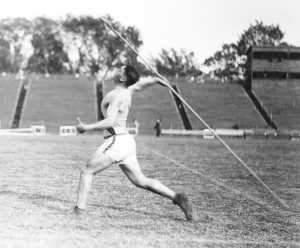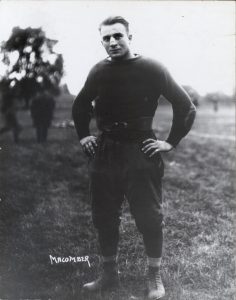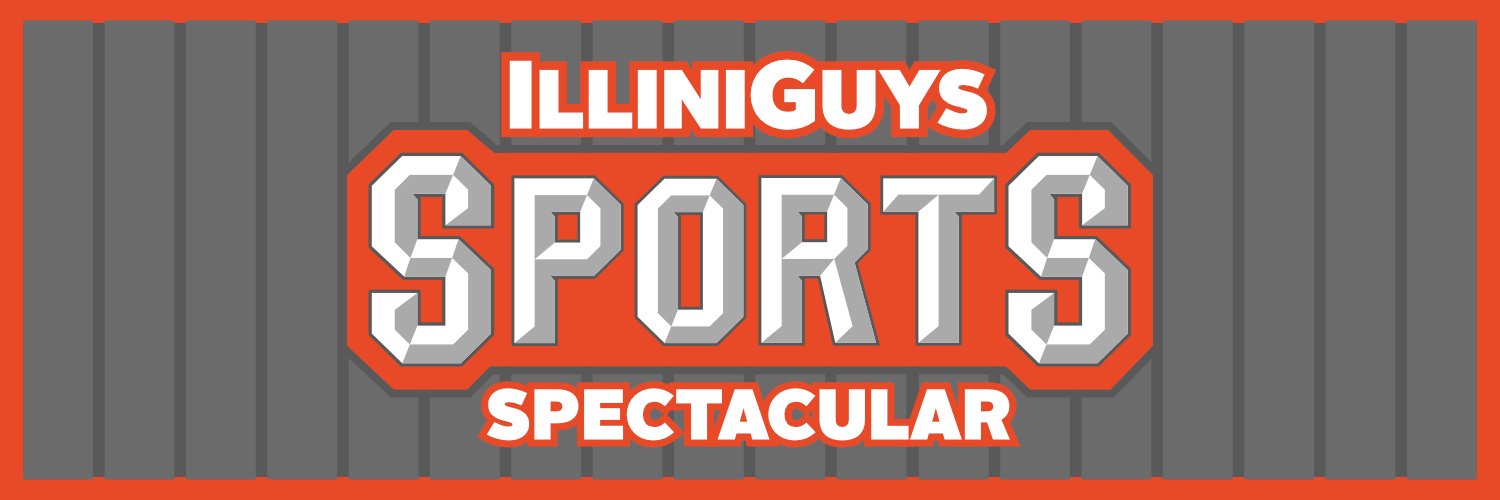2021 Hall-of-Fame Class Honors Pre-1950s Legends
DIA Press Release
January 22, 2022
Champaign, IL – The Division of Intercollegiate Athletics named 28 new members to the University of Illinois Athletics Hall of Fame as the Class of 2021, including athletes, coaches and administrators who competed and led prior to 1950.

Tug Wilson courtesy Illinois Athletics
The star-studded class is filled by Olympic medalists, a Pro Football Hall of Famer, College Football Hall of Famers, a two-time world series champion, NCAA and Big Ten champions, and long-time administrative leaders.
“It was important for us to have continuity with our Hall of Fame classes despite the disruption caused by the pandemic the last two years,” said Illinois Director of Athletics Josh Whitman. “Every outstanding member of this class is deserving of inclusion in our Athletics Hall of Fame, even though their time at Illinois concluded long ago, before many of the modern and welcome advances we enjoy in college athletics today. By naming this unique Class of 2021, we are able to honor their legacies appropriately, while moving forward quickly to the Class of 2022 with a more traditional representation of Fighting Illini legends.”
Football is represented by longtime assistant coach Justa Lindgren, Carl Lundgren, Claude Rothgeb, Bart Macomber, John Depler, Jim McMillen and Bernie Shively. Basketball legends include Hugh “Shorty” Ray, Ray Woods, Tug Wilson, Bill Hapac, Hoot Evers and Jack Smiley.
Track and Field is represented by Rothgeb, Ed Lindberg, Wilson, Horatio Fitch, Shively, Dan Kinsey and Evers. The wrestling program adds McMillen, Paul Prehn, Shively, Hek Kenney, Ruffy Silverstein and Allen Sapora. Baseball has Lundgren, Rothgeb, Ray, Hapac and Evers. Swimmers include Bill Vosburgh and Charles Flachmann. Gymnasts in the class are Paul Fina and Caton Cobb. Tennis champion Tim O’Connell also makes the class.
Coaching legends in the Class of ’21 include Lundgren, Lindgren, Prehn, Kenney and Price. Shively was a longtime AD at Kentucky and Wilson was AD at Drake and Northwestern before his stint as the second Big Ten Commissioner. Support staff being honored are long-time athletics trainer and equipment manager Matt Bullock and the nation’s first full-time sports publicist, Michael Tobin. Hugh “Shorty” Ray is one of six Illini in the Pro Football Hall of Fame and credited as the primary writer of the rules book while serving as the NFL Supervisor of Officials from 1938-52.
The Class of 2021 was selected by the UI Athletics Hall of Fame Advisory Committee in late 2021. Because all members of the 2021 class are deceased and competed or coached many decades ago, the UI will not host a traditional induction ceremony, but will celebrate these legendary figures around the Illinois men’s basketball game against Penn State on March 3, 2022.
The Hall of Fame Class of 2022 will be announced in the spring of 2022 and inducted the weekend of September 23-24, when Illinois hosts Chattanooga in football.
Fighting Illini Athletics Hall of Fame Class of 2021
Justa Lindgren, Football (1898-1901); Football Coach (1904-43)
Carl Lundgren, Baseball (1900-1902), Football (1899-1900), Baseball Coach (1921-34)
Claude Rothgeb, Football (1900, 1902-04), Baseball (1904-05), Track & Field (1902-05)
Hugh “Shorty” Ray, Baseball (1905-06), Basketball captain (1906); Pro Football Hall of Fame
Ed Lindberg, Track & Field (1906-09)
Bill Vosburgh, Swimming (1911-13)
Bart Macomber, Football (1914-16)
Ray Woods, Basketball (1915-17)
Matt Bullock, Athletics Trainer (1916-47), Equipment Manager (1913-46)
John Depler, Football (1918-20)
Kenneth “Tug” Wilson, Track & Field (1918-20), Basketball (1919-20), Big Ten Commissioner (1945-61)
Jim McMillen, Football (1921-23), Wrestling (1923-24)
Paul Prehn, Wrestling Coach (1921-28)
Michael Tobin, Sports Information Director (1922-44)
Horatio Fitch, Track & Field (1922-23)
Bernie Shively, Football (1924-26), Wrestling (1926-27), Track & Field (1925-27)
Dan Kinsey, Track & Field (1924-25)
Tim O’Connell, Tennis (1926-28)
Harold “Hek” Kenney, Wrestling (1924-26), Wrestling Coach (1929-43; 1946-47)
Hartley Price, Gymnastics Coach (1930-48), Soccer Coach (1927-33)
Charles Flachmann, Swimming (1933-35)
Ralph “Ruffy” Silverstein, Wrestling (1935-37)
Allen Sapora, Wrestling (1936-38)
Bill Hapac, Basketball (1938-40), Baseball (1938-40)
Paul Fina, Gymnastics (1939-41)
Walter “Hoot” Evers, Baseball (1940), Basketball (1940), Track & Field (1940)
Caton Cobb, Gymnastics (1941-42)
Jack Smiley, Basketball (1942-43, 47)
Justa Lindgren, Football (1898-1901); Football Coach (1904-43)
Following Justa Lindgren’s playing career that culminated as captain of the 1901 team, he joined the coaching ranks and served on staffs for three Fighting Illini head coaches. Lindgren was assistant football coach from 1904-43 under Arthur Hall, Robert Zuppke and Ray Eliot, coaching the offensive line. He started his coaching career as head coach at Cornell College in Iowa from 1902-03 (4-11). Lindgren was member of the Alumni coaches group that rotated as head coaches in 1904 (9-2-1), and was head coach alone in 1906, finishing 1-3-1. He also was a chemist who served on the chemistry staff at the UI and as an analyst for the Illinois Geological Survey and State Water Survey. Lindgren died in 1951 at the age of 72.
Carl Lundgren, Baseball (1900-02) and Football (1899-1900); Baseball Coach (1921-34)
Carl Lundgren served as the Fighting Illini baseball coach from 1921-34, compiling a record of 209-78-14 while winning five Big Ten titles (1921, 1922, 1927, 1931, 1934). The immortal George Huff called him “the greatest of all college baseball coaches.” Lundgren played Major League Baseball from 1902-09, and was a pitcher for the 1907 and ‘08 World Series Champion Chicago Cubs. He compiled a pitching record of 91-55 (2.42 ERA) in 179 career MLB games. Lundgren also coached baseball at Michigan from 1915-20, winning three Big Ten titles and compiling a 93-33-6 record in six seasons. He was a halfback and two-way starter for the football team in 1899 and 1900. Lundgren led the Illini to Western Conference baseball championships in 1900 and 1902. He was the 1902 UI Senior Class President. Lundgren also served the UI as assistant athletics director, and at times as business manager and acting AD. He taught at the “school of coaches” in the College of Physical Education and was the baseball coach who led Illinois on a celebrated month-long tour of exhibition games in Japan in 1928. He died of a sudden heart attack at age 54 in 1934.
Claude Rothgeb, Football (1900, 1902-04), Baseball (1904-05) and Track & Field (1902-05)
Claude Rothgeb earned 10 letters for the second-most in Illini history. As an end, he earned All-America honors in football as a senior in 1904 and posted a .351 batting average as a senior left fielder on a Big Ten baseball in 1905 before entering a brief MLB career. He helped lead the Illini to the 1904 Big Ten baseball title as a junior. Rothgeb was captain of the 1903 football squad and 1905 baseball team. He won the Big Ten title in shot put in 1903 and was also a sprinter while lettering four times in track and field. Rothgeb died in 1944 at the age of 64.
Hugh “Shorty” Ray, Baseball (1905-06), Basketball (1906), Contributor to Sport
Shorty Ray contributed to the game of professional football as the primary writer of the rules book and as the NFL Supervisor of Officials from 1938-52. Ray streamlined rules to improve tempo of play and increase safety. Only 5-6, 136 pounds, he played baseball, football and basketball at Illinois and was captain of the 1906 basketball team. Ray officiated Big Ten football, basketball and baseball games in the 1920s and 30s. He was referred to as pro football’s “unknown hero,” who helped save an often-unexciting game from extinction. At the urging of George Halas, brought his officiating expertise to the NFL in 1938 and insisted his officials become absolute masters of the rules book. Ray was enshrined into the Pro Football Hall of Fame in 1966. He died in 1956 at age of 71.
Ed Lindberg, Track & Field (1906-09)
Ed Lindberg was a 1912 Olympic gold medalist in the 1600m relay, running the second leg for the United States team that set the world record. He helped the Illini to Big Ten Outdoor titles in 1906 and 1909 and won the AAU championships in the 440-yard dash in 1909 and 1911. In addition to his gold medal at the Stockholm Olympics in ’12, Lindberg won the bronze in the 400 meters. He died in 1978 at the age of 91.
Bill Vosburgh, Swimming (1911-13)
Bill Vosburgh led Illinois to the first three Big Ten swimming team championships, while winning 10 individual conference event titles and two relay titles. He was captain of the team as a senior. Vosburgh won four individual titles as a junior in the 40, 100, 220 and 440-yards. Vosburgh competed on the water polo team at the 1920 Antwerp Olympic games and was inducted into the USA Water Polo Hall of Fame in 1981. He competed for the AAU Senior National Championship Water Polo team seven times in 1914, 15, 16, 17, 18, 21 and 23. His relay team won the 400-meter national championship in 1914, 15 and 16. He died in 1953 at the age of 62.
Bart Macomber, Football (1914-16)

Bart Macomber courtesy Illinois Athletics
Bart Macomber was a 1915 Consensus All-American as a halfback after leading the Illini to undefeated seasons in 1914 and 1915. He helped lead Illinois to the 1914 national and conference championship and a co-championship in 1915. Macomber earned Second-Team All-America status in 1916. He was First-Team All-Big Ten halfback in 1915 and First-Team All-Big Ten quarterback in 1916. Macomber was selected to College Football Hall of Fame in 1972. He also played for Bob Zuppke at Oak Forest High School and did the majority of the team’s kicking while playing every backfield position. As a senior, Macomber was captain of the 1916 team. He died in 1971 at the age of 77.
Ray Woods, Basketball (1915-17)
Ray Woods earned First-Team All-America honors three times in 1915-16-17 and was the 1917 Helms National Player of the Year. Woods helped the 1915 Illini to the only unbeaten season in UI history and were named National Champions. He helped lead the Illini to Big Ten titles in 1915 and 1917 while earning First-Team All-Big Ten honors in 1915 and 16, and Second-Team honors in 1917. He captained the 1916 squad. Woods was named to the Illinois All-Century Team in 2005. He died in 1965 at age of 70.
Matt Bullock, Athletics Trainer (1916-47), Equipment Manager (1913-46)
Matt Bullock was one of Illinois’s longest-serving staff members, starting as assistant athletics trainer from 1914-15 before becoming head athletics trainer in 1916 until 1947. He was inducted into the initial class of the National Athletics Trainers Association Hall of Fame in 1962. Known as the “Trainer of Trainers” with eight of his students and assistants going on to induction into the NATA Hall of Fame. He also served Illinois as an equipment manager during the entire Robert Zuppke Era and through the first few seasons under Ray Eliot. Bullock died in 1953 at 67 years.
John Depler, Football (1918-20)
John Depler earned All-America honors as a center in 1918, 1919 and 1920, including being named consensus All-American in 1918. He helped lead the 1918 and 1919 teams to Big Ten titles, and the 1919 squad to a national championship. Depler was First-Team All-Big Ten in 1919 and 1920. Following his collegiate career, he played for the Hammond Pros of the NFL in 1921. Depler went on to coach eight years as an assistant at Columbia, then returned as a player with the Orange Tornadoes in 1929. He co-founded the Brooklyn Dodgers professional football team in 1930 and served as an owner until 1933. Depler died in 1970 at age of 71.
Tug Wilson, Track & Field (1918-20), Basketball (1919-1920)
Kenneth “Tug” Wilson served as second Big Ten Commissioner from 1945-61 and was President of the U.S. Olympic Committee from 1953-65. Wilson played basketball and competed for the Illini track and field teams at Illinois, helping the Illini win the 1920 Big Ten track and field title and serving as captain of the 1920 basketball squad. He made the 1920 U.S. Olympic Team as a discus and javelin thrower, finishing 10th in the discus at Antwerp. Highlights as Commissioner included Rose Bowl agreement to have Big Ten and Pacific Conference champions match up each year, the addition of Michigan State and helped lead conference school desegregation efforts. After starting his athletics administration career as an assistant athletics director at Illinois under George Huff from 1920-22, he served as Athletics Director at Drake (1922-25) and Northwestern (1925-45). At Drake, he dramatically raised the profile of the Drake Relays. Wilson was a member of the President’s Council on Youth Fitness under Presidents Eisenhower and Kennedy. Wilson also served as secretary-treasurer of the NCAA. He died in 1979 at 82 years.
Jim McMillen, Football (1921-23), Wrestling (1923-24)
Jim McMillen was a 1923 Consensus All-American as a guard blocking for the immortal Red Grange. He also earned Second-Team All-America honors in 1922 and First-Team All-Big Ten honors in 1922 and 1923. McMillen was captain of the undefeated national and Big Ten champion squad of 1923. After college, he played guard five seasons for the Chicago Bears. McMillen also wrestled for the Illini, losing just two matches in three years and helping the Illini to the 1924 Big Ten title. He finished second at the 1923 conference meet and tied for third at the 1924 meet. While playing for the Bears, he continued to wrestle professionally on the side and even left the team for a time because of how much money he was making in the ring. In 1932, he was given a chance to buy stock in the Bears which eventually allowed him to become of the team’s vice presidents. He died in 1984 at the age of 81.
Paul Prehn, Wrestling Coach (1921-28)
Paul Prehn led Illinois to seven Big Ten championships in his nine years as head coach and ending his career with a record of 42-5-0. He was ring commissioner for The Long Count Fight between Gene Tunney and Jack Dempsey at Soldier Field in 1927. In 1928, Prehn was elected as President of the National Boxing Association (now World Boxing Association). In 1925, he wrote “Scientific Methods of Wrestling” which is still in print today. In his later years, Prehn operated two restaurants on the UI campus (Prehn’s on Oregon and Prehn’s on Green). He died in 1973 at age of 80.
Horatio Fitch, Track & Field (1922-23)
Horatio Fitch was the 1924 Olympic Silver medalist in the 400-meters after setting the world record of 47.8 seconds during the semifinal heat at the Paris Olympics. His race in the Olympics was memorialized in the 1982 movie “Chariots of Fire” when the race winner was Eric Liddell, who passed up the 100-meter dash, his specialty, because it was held on Sunday. The British winner of the gold broke Fitch’s world record in the finals. Fitch helped the Illini to the 1922 Big Ten indoor and outdoor titles. He won the 1923 AAU 440-yard national championship. Fitch helped the Illinois quarter-mile relay team set an American record at the 1923 Drake Relays and helped his mile relay team win a Big Ten title at the 1923 Big Ten Outdoor Championships. Fitch finished fourth in the 440-yard dash at the 1923 NCAA Outdoor Championships. He died in 1985 at the age of 85.
Michael Tobin, Sports Information Director (1922-44)
Louis Michael Tobin was hired by George Huff as the first Sports Information Director at Illinois and first full-time sports publicist in collegiate sports. He served the Illini from 1922-44 and is, credited for archiving the rich Illinois athletics history. Tobin knew every newspaper sportswriter in the Midwest, and most around the nation. He developed relationships with media from coast-to-coast and helped spread the incredible exploits of the legendary Red Grange in the mid-1920s to the fabulous Whiz Kids of the early 1940s. Tobin was the selected to the initial College Sports Information Director of America (CoSIDA) Hall of Fame class in 1969. Died at 64 years in 1944.
Bernie Shively, Football (1924-26), Wrestling (1926-27), Track & Field (1925-27)
Bernie Shively was a star multi-sport athlete at Illinois, earning letters in football from 1924-26, wrestling in 1926 and 1927, and track and field from 1925-27. Shively was considered the top blocker for the legendary Red Grange in 1924 and 1925 before earning consensus All-America honors in 1926. As a wrestler, he was the 1926 Big Ten Heavyweight co-champ and helped the Illini to Big Ten team titles in 1926 and 1927. Shively grappled to a draw with his heavyweight opponent from Indiana on the championship mat in 1926 and lost a coinflip. Shively was a top hammer thrower for the track and field team and helped the Illini to the 1927 Big Ten Outdoor title. He later became the Athletics Director at Kentucky from 1938 until he died in 1967 at the age of 65. Shively became a member of the College Football Hall of Fame 1982. His name adorns the Kentucky track and field stadium. He served Kentucky as an assistant football coach and was interim head coach in 1945, prior to hiring Bear Bryant.
Dan Kinsey, Track & Field (1924-25)
Dan Kinsey was the 1924 Olympic gold medalist in the 110-meter hurdles at the Paris Olympics. He helped the Illini to the Big Ten indoor and outdoor titles in 1924. Outdoors, Kinsey won the Big Ten 120-yard hurdles and finished second in the 220-yard hurdles in 1924, before winning the 220-yard hurdles in 1925. At the indoor championships in 1924, he won the 60-yard high hurdles. Kinsey studied physical education and coached track at Oberlin College from 1929-1959 while also coaching cross country from 1928-58. He served as president of the NCAA Cross Country Coaches Association in 1949 and 1950. Kinsey died in 1970 at the age of 68.
Tim O’Connell, Tennis (1926-28)
Tim O’Connell was a three-time Big Ten Singles Champion from 1926-28, while winning the doubles championship twice. He helped Illinois to Big Ten team titles all three years. O’Connell still ranks second all-time in Big Ten history with five individual titles and tied for first all-time with three singles titles. (Individual singles and doubles championships were discontinued in 1986). O’Connell continued his tennis pursuits after graduating from Illinois, earning amateur titles both as a singles and a doubles player. He died in 1987 at the age of 82.
Harold “Hek” Kenney, Wrestling (1924-26); Wrestling Coach (1929-43; 1946-47)
Hek Kenney is remembered as the man for whom Kenney Gym is named, but his record as Illini wrestling coach is what led to his Hall of Fame status. A two-time captain during his Illini career under Coach Paul Prehn, Kenney succeeded his mentor as coach starting in 1929. Kenney led Illinois to a dual meet mark of 91-28-2 over 15 seasons, and posted six Big Ten titles. The Illini finished second in the NCAA Championships twice and added one third-place finish. Kenney produced nine individual NCAA champions, 13 runners-up; 10 third-place winners and four fourth-place finishers. He was responsible for starting the Illinois High School State Wrestling Championships. World War II interrupted his coaching career to serve the Navy as Director of Physical Training for the 6th Naval District. So respected was Kenney that he served two terms as president of the National Wrestling Coaches and Officials Association. He was professor of physical education from 1955-67 and assistant dean in College of Physical Education (1963-67) prior to his retirement. Two years later, he was honored as the first recipient of the College of Physical Education’s “Distinguished Alumnus Award.” Kenney died in 1972 at the age of 69. On April 25, 1974, the building in which he toiled for most of his life was renamed in his honor.
Hartley Price, Gymnastics Coach (1930-48), Soccer Coach (1927-33)
Hartley Price established himself as one of the nation’s premier gymnastics coaches by leading four NCAA team champions, one third-place finish, two national AAU titles and winning four Big Ten Championships. Price compiled an 83-21 dual record with the Illini and was 150-41 overall. A native of Brisbane, Australia, Price trekked to Springfield College in Massachusetts where he competed in gymnastics and obtained his bachelor’s degree in physical education, the first of five college degrees, including a doctorate, he would obtain during his life. Price joined the UI physical education faculty in 1927 and installed soccer as a varsity sport at Illinois as well as the Big Ten Conference. He introduced tumbling into college cheerleading and in 1940, organized a card display section at Illini football games. Price moved to Florida State after WWII and led the Seminoles to five national titles, including NCAA titles in 1951 and 1952, and AAU titles in 1951, 1953 and 1954. He died in Tallahassee in 1977 at the age of 75, and is a member of the FSU Athletics Hall of Fame. Price served 20 years on the U.S. Olympic Gymnastics Committee.
Charles Flachmann, Swimming (1933-35)
Charles Flachmann was one of Illinois’s most brilliant athletes in the 1930s. He won NCAA 50-meter freestyle titles as a junior and senior, and the NCAA 100-meter freestyle title in 1935. Flachmann was the 1934 and 35 Big Ten champ in the 50-yard freestyle and 100-yard freestyle races. He was also the 1934 220-yard freestyle champ. In the 1935 Big Ten meet, Flachmann served as anchorman on the record-setting 440-yard relay team. He also won national titles in all three events. Flachmann later served as a captain in the army during World War II. He died in 1983 at the age of 69.
Ralph “Ruffy” Silverstein, Wrestling (1935-37)
Ruffy Silverstein was the 1935 NCAA Champion and All-American at 175 pounds. He also boasted Big Ten Championships at 175 lbs. in 1935 and as heavyweight in 1936. Silverstein never lost a match at Illinois, and helped lead the Illini to the 1935 Big Ten team title. He was a member of the 1936 U.S. Olympic team, but because the Olympics were held in Nazi Germany, was one of several Jewish athletes who boycotted that year’s Olympics. He finished second at the U.S. Olympic Trials in 1936, but was still named to the team. Silverstein had a long professional wrestling career, with his signature move being the “Falling Arm Drag.” A long-time coach after his retirement, Silverstein was diagnosed with Lou Gehrig’s disease in 1977 and died in 1980 at 66 years. He is a member of the Professional Wrestling Hall of Fame.
Allen Sapora, Wrestling (1936-38)
Allen Sapora joins his brother, Joe, as an Illinois Athletics Hall of Famer. Sapora was the 1938 NCAA Champion at 126 lb. and won the 1937 Big Ten title at the same weight. When he won the national championship, it marked the first time that brothers accomplished that feat with his brother Joe winning in 1929 and 1930. The Illini won the 1937 Big Ten title and placed second at the 1938 NCAA meet. Sapora served as assistant coach to Hek Kenney and went on to teach at the UI after earning his doctorate. He became a long-time official, serving at five Illinois state championship meets. Allen Sapora died in 2002 at the age of 92.
Bill Hapac, Basketball (1938-40)
Bill Hapac was Illinois’s first consensus All-American in 1940 as well as the school’s first UI Athlete of the Year. Hapac set the Big Ten scoring record with unheard of 34 points against Minnesota in 1940. Nicknamed “Wild Bill,” he was named First-Team All-Big Ten in 1940 after leading the conference in scoring with an average of nearly 14 points per game. Hapac also lettered three times in baseball from 1938-40, twice scoring a school-record five runs in a game. He played pro basketball in the National Basketball League from 1940-48, although he had a four-year break for military service, earning All-NBL Second Team honors in 1941. Hapac died in 1967 at the age of 49 from an undisclosed rare disease.
Paul Fina, Gymnastics (1939-41)
Paul Fina earned a spot on the 1940 and 1944 Olympic Teams only to have both cancelled because of World War II. He was still named Honorary Olympic Team Member for both the 1940 and 1944 teams. Fina was the 1940 NCAA All-Around co-champion with teammate and fellow Illini hall-of-famer Joe Giallombardo. He was a nine-time All-American and four-time Big Ten Champion. He helped Illinois win the 1939 and 1941 Big Ten titles, along with a runner-up finish by one-half point in 1940. The Illini won NCAA Championships in 1939, 1940 and 1941. Fina died in 2009 at the age of 94 years.
Walter “Hoot” Evers, Basketball (1940), Track & Field (1940) and Baseball (1940)
As a sophomore during 1939-40, Walter “Hoot” Evers was the most versatile athlete on the Illinois campus. In baseball, he compiled a .353 batting average and led the Big Ten in total bases, runs, triples, home runs and RBIs. On the basketball court, he was the Illini’s second-leading scorer to fellow hall-of-famer Bill Hapac. And, on the track, coach Leo Johnson pulled Evers off the ball diamond to compete in the Big Ten outdoor meet as a javelin thrower. Despite practicing just one week, “Hoot” placed second at the outdoor championships. At the end of the baseball season, Evers received numerous offers to quit college and play professional baseball, which he turned down. However, in January, 1941, he was declared academic ineligible to continue playing basketball. A week later, Evers signed to play baseball for the Detroit Tigers and enjoyed a long MLB career from 1941-56 with five different teams. He was named an All-Star in 1948 and 1950 and finished 11th in voting for the 1950 AL MVP. Evers went on to Work for Cleveland as a scout, coach and farm system executive from 1957-70 and as the Tigers’ director of player development from 1970-78. He died in 1991 at the age of 69.
Caton Cobb, Gymnastics (1941-42)
Caton Cobb established himself as one of the all-time greats by winning three NCAA individual titles, securing five Big Ten titles and earning All-America status eight times in just two seasons. Cobb helped the Illini to Big Ten and NCAA team titles in both 1941 and 1942. He won NCAA side horse titles in 1941 and 1942, and the 1941 parallel bars. In addition, Cobb finished second in parallel bars, second in the all-around and fourth in the long horse in 1942, when he was the Illini team captain. Cobb did not compete as a senior after enlisting in the Marines during World War II. He died in 1974 at the age of 65.
Jack Smiley, Basketball (1942-43, 47)
Jack Smiley established himself with the amazing Whiz Kids that went 35-6 from 1941-43, helping the Illini to Big Ten titles in 1942 and ’43. Smiley was named third-team All-American in 1943 and 1947. He earned First-Team All-Big Ten honors in 1943, and was named to the Second-Team in 1942 and 1947. The Whiz Kids turned down an invitation to the NCAA tournament in 1943 after Smiley, Gene Vance and Andy Phillip were drafted into the military mid-season. During World War II, Smiley was engaged at the Battle of the Bulge, once firing his 105 mm Howitzer for 96 continuous hours. Upon return to college following the war, he won team MVP honors in 1947. Smiley played two seasons in the NBA, and was player-coach of the Waterloo Hawks for 27 games in the 1950 season. He died in 2000 at the age of 77.

Nov 29 Weekend - Hour 2 - S4Ep16
Listen
Nov 29 Weekend - Hour 1 - S4Ep16
Listen
Illinois Fighting Illini 90-77 Win Over Arkansas Razorbacks - #435
Listen
IlliniGuys Halftime LIVE - Interview with Grant Beerman 4-Star LB Commit #434
Listen
Thanksgiving Special - Big Sports Radio Nov 29 Weekend #433
Listen
Illinois Fighting Illini Win 92-34 Over Little Rock - #431
Listen
Illinois Fighting Illini at Northwestern Wildcats Football Preview - #431
Listen
Heat Checks & Hail Marys - B1G vs SEC for CFP, Hot Takes and B1G FB Tiers
Listen
Illinois Fighting Illini Win 87-40 in a “CritterKill” over UMES - #430
Listen
Illinois Fighting Illini Execute a Huge 2nd Half Rally to Defeat Rutgers 38-31 - #429
Listen
Nov 22 Weekend - Hour 2 - S4Ep15
Listen
Nov 22 Weekend - Hour 1 - S4Ep15
Listen
Illinois Fighting Illini Fall 100-87 to Alabama Crimson Tide #428
Listen
Illinois Fighting Illini at Rutgers Scarlet Knights Football Preview #427
Listen
Heat Checks & Hail Marys - Looming B1G vs SEC Battle, Deion Roster Strategy, Indiana Genius Move, Illini Trending Up, Hire Better & B1G FB Tiers
Listen